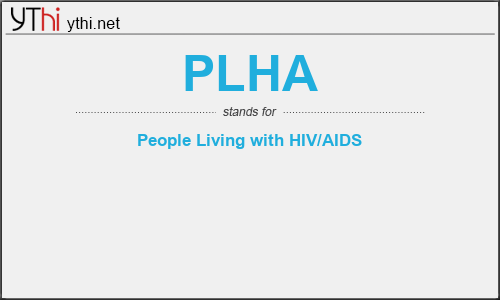What does PLHA mean? What is the full form of PLHA?
The Full Form of PLHA is People Living with HIV/AIDS.
The human immunodeficiency viruses (HIV) are two species of Lentivirus (a subgroup of retrovirus) that infect humans. Over time, they cause acquired immunodeficiency syndrome (AIDS), a condition in which progressive failure of the immune system allows life-threatening opportunistic infections and cancers to thrive.Without treatment, average survival time after infection with HIV is estimated to be 9 to 11 years, depending on the HIV subtype.In most cases, HIV is a sexually transmitted infection and occurs by contact with or transfer of blood, pre-ejaculate, semen, and vaginal fluids. Research has shown (for both same-sex and opposite-sex couples) that HIV is untransmittable through condomless sexual intercourse if the HIV-positive partner has a consistently undetectable viral load. Non-sexual transmission can occur from an infected mother to her infant during pregnancy, during childbirth by exposure to her blood or vaginal fluid, and through breast milk. Within these bodily fluids, HIV is present as both free virus particles and virus within infected immune cells.
HIV infects vital cells in the human immune system, such as helper T cells (specifically CD4+ T cells), macrophages, and dendritic cells.HIV infection leads to low levels of CD4+ T cells through a number of mechanisms, including pyroptosis of abortively infected T cells,apoptosis of uninfected bystander cells, direct viral killing of infected cells, and killing of infected CD4+ T cells by CD8+ cytotoxic lymphocytes that recognize infected cells. When CD4+ T cell numbers decline below a critical level, cell-mediated immunity is lost, and the body becomes progressively more susceptible to opportunistic infections, leading to the development of AIDS.
Receiving a diagnosis of HIV can be a life-changing event. But HIV does not equal death. Most people with HIV live long and healthy lives if they get and stay on treatment.
There will be a period of adjustment. People who are newly diagnosed can feel many emotions—sadness, hopelessness, and even anger. Pay attention to your mental health. Your HIV health care provider can help you access mental health services to help you work through the early stages of your diagnosis and begin to manage your HIV.
Talking to others who have HIV may also be helpful. You are not alone. Ask your provider for help finding a local HIV support group. Learn about how other people living with HIV have handled their diagnosis.
PLHA
means
People Living with HIV/AIDS![]()
Translate People Living with HIV/AIDS to other language.


Leave a Reply
You must be logged in to post a comment.